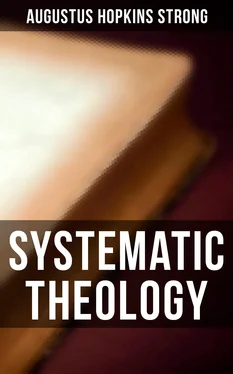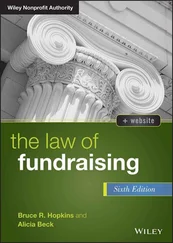Versus Sir Wm. Hamilton, Metaph., 96–116, and Herbert Spencer, First Principles, 68–97. This doctrine of relativity is derived from Kant, Critique of Pure Reason, who holds that a priori judgments are simply “regulative.” But we reply that when our primitive beliefs are found to be simply regulative, they will cease to regulate. The forms of thought are also facts of nature. The mind does not, like the glass of a kaleidoscope, itself furnish the forms; it recognizes these as having an existence external to itself. The mind reads its ideas, not into nature, but in nature. Our intuitions are not green goggles, which make all the world seem green: they are the lenses of a microscope, which enable us to see what is objectively real (Royce, Spirit of Mod. Philos., 125). Kant called our understanding “the legislator of nature.” But it is so, only as discoverer of nature's laws, not as creator of them. Human reason does impose its laws and forms upon the universe; but, in doing this, it interprets the real meaning of the universe.
Ladd, Philos. of Knowledge: “All judgment implies an objective truth according to which we judge, which constitutes the standard, and with which we have something in common, i.e., our minds are part of an infinite and eternal Mind.” French aphorism: “When you are right, you are more right than you think you are.” God will not put us to permanent intellectual confusion. Kant vainly wrote “No thoroughfare” over the reason in its highest exercise. Martineau, Study of Religion, 1:135, 136—“Over against Kant's assumption that the mind cannot know anything outside of itself, we may set Comte's equally unwarrantable assumption that the mind cannot know itself or its states. We cannot have philosophy without assumptions. You dogmatize if you say that the forms correspond with reality; but you equally dogmatize if you say that they do not. … 79—That our cognitive faculties correspond to things as they are , is much less surprising than that they should correspond to things as they are not .” W. T. Harris, in Journ. Spec. Philos., 1:22, exposes Herbert Spencer's self-contradiction: “All knowledge is, not absolute, but relative; our knowledge of this fact however is, not relative, but absolute.”
Ritschl, Justification and Reconciliation, 3:16–21, sets out with a correct statement of the nature of knowledge, and gives in his adhesion to the doctrine of Lotze, as distinguished from that of Kant. Ritschl's statement may be summarized as follows: “We deal, not with the abstract God of metaphysics, but with the God self-limited, who is revealed in Christ. We do not know either things or God apart from their phenomena or manifestations, as Plato imagined; we do not know phenomena or manifestations alone , without knowing either things or God, as Kant supposed; but we do know both things and God in their phenomena or manifestations, as Lotze taught. We hold to no mystical union with God, back of all experience in religion, as Pietism does; soul is always and only active, and religion is the activity of the human spirit, in which feeling, knowing and willing combine in an intelligible order.”
But Dr. C. M. Mead, Ritschl's Place in the History of Doctrine, has well shown that Ritschl has not followed Lotze. His “value-judgments” are simply an application to theology of the “regulative” principle of Kant. He holds that we can know things not as they are in themselves, but only as they are for us. We reply that what things are worth for us depends on what they are in themselves. Ritschl regards the doctrines of Christ's preexistence, divinity and atonement as intrusions of metaphysics into theology, matters about which we cannot know, and with which we have nothing to do. There is no propitiation or mystical union with Christ; and Christ is our Example, but not our atoning Savior. Ritschl does well in recognizing that love in us gives eyes to the mind, and enables us to see the beauty of Christ and his truth. But our judgment is not, as he holds, a merely subjective value-judgment—it is a coming in contact with objective fact. On the theory of knowledge held by Kant, Hamilton and Spencer, see Bishop Temple, Bampton Lectures for 1884:13; H. B. Smith, Faith and Philosophy, 297–336; J. S. Mill, Examination, 1:113–134; Herbert, Modern Realism Examined; M. B. Anderson, art.: “Hamilton,” in Johnson's Encyclopædia; McCosh, Intuitions, 139–146, 340, 341, and Christianity and Positivism, 97–123; Maurice, What is Revelation? Alden, Intellectual Philosophy, 48–79, esp. 71–79; Porter, Hum. Intellect, 523; Murphy, Scientific Bases, 103; Bib. Sac. April, 1868:341; Princeton Rev., 1864:122; Bowne, Review of Herbert Spencer, 76; Bowen, in Princeton Rev., March, 1878:445–448; Mind, April, 1878:257; Carpenter, Mental Physiology, 117; Harris, Philos. Basis of Theism, 109–113; Iverach, in Present Day Tracts, 5: No. 29; Martineau, Study of Religion, 1:79, 120, 121, 135, 136.
3. God's revelation of himself to man.
In God's actual revelation of himself and certain of these relations.—As we do not in this place attempt a positive proof of God's existence or of man's capacity for the knowledge of God, so we do not now attempt to prove that God has brought himself into contact with man's mind by revelation. We shall consider the grounds of this belief hereafter. Our aim at present is simply to show that, granting the fact of revelation, a scientific theology is possible. This has been denied upon the following grounds:
A. That revelation, as a making known, is necessarily internal and subjective—either a mode of intelligence, or a quickening of man's cognitive powers—and hence can furnish no objective facts such as constitute the proper material for science.
Morell, Philos. Religion, 128–131, 143—“The Bible cannot in strict accuracy of language be called a revelation, since a revelation always implies an actual process of intelligence in a living mind.” F. W. Newman, Phases of Faith, 152—“Of our moral and spiritual God we know nothing without—everything within.” Theodore Parker: “Verbal revelation can never communicate a simple idea like that of God, Justice, Love, Religion”; see review of Parker in Bib. Sac., 18:24–27. James Martineau, Seat of Authority in Religion: “As many minds as there are that know God at first hand, so many revealing acts there have been, and as many as know him at second hand are strangers to revelation”; so, assuming external revelation to be impossible, Martineau subjects all the proofs of such revelation to unfair destructive criticism. Pfleiderer, Philos. Religion, 1:185—“As all revelation is originally an inner living experience, the springing up of religious truth in the heart, no external event can belong in itself to revelation, no matter whether it be naturally or supernaturally brought about.”Professor George M. Forbes: “Nothing can be revealed to us which we do not grasp with our reason. It follows that, so far as reason acts normally, it is a part of revelation.”Ritchie, Darwin and Hegel, 30—“The revelation of God is the growth of the idea of God.”
In reply to this objection, urged mainly by idealists in philosophy, (a) We grant that revelation, to be effective, must be the means of inducing a new mode of intelligence, or in other words, must be understood. We grant that this understanding of divine things is impossible without a quickening of man's cognitive powers. We grant, moreover, that revelation, when originally imparted, was often internal and subjective.
Matheson, Moments on the Mount, 51–53, on Gal. 1:16—“to reveal his Son in me” : “The revelation on the way to Damascus would not have enlightened Paul, had it been merely a vision to his eye. Nothing can be revealed to us which has not been revealed in us. The eye does not see the beauty of the landscape, nor the ear hear the beauty of music. So flesh and blood do not reveal Christ to us. Without the teaching of the Spirit, the external facts will be only like the letters of a book to a child that cannot read.” We may say with Channing: “I am more sure that my rational nature is from God, than that any book is the expression of his will.”
Читать дальше












